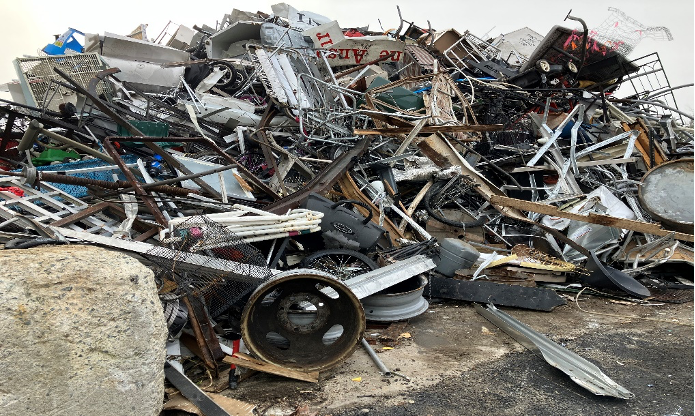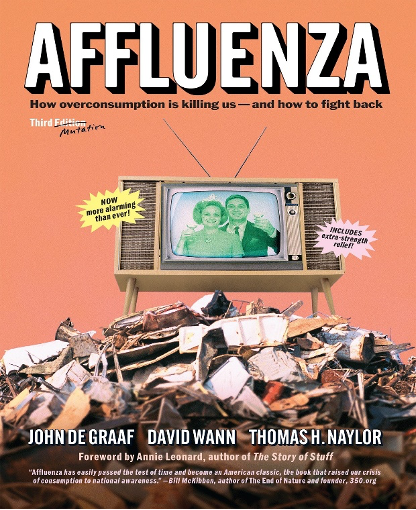Money Eats the World
Wishing away overconsumption without reducing population or affluence is a denial of math.
“It is easier to imagine the end of the world than the end of capitalism.” – Mark Fisher[1]
I am congenitally cheap. There is Scottish blood in my veins, which may explain why our family crest reads: “Fix it up, wear it out, make it do, or do without.”
I never pass a penny on the sidewalk, I’ve used the same skis for 30 years, I drive my vehicles into the ground, and duct tape is an essential ingredient in my life. I’ve lived in Buddhist monasteries for long periods and even considered ordaining as a monk. The pinched pennies have piled up, allowing me to work less, support charities, and conserve land.
Yet, as hard as I try to reduce my consumption, I cannot. It’s not because I lack self-control. It’s because wealth never sleeps.
Earlier this year I wrote an article about the root problem of human overpopulation. Though the article was well-received, predictably I received pushback. Some of my math-challenged critics contend that overconsumption is the problem, not overpopulation. Even well-intentioned friends maintain that overconsumption is the evil twin of overpopulation.
Are there too many of us or do we consume too much? Most people answer “yes,” though it is fashionable among progressives to blame fat rich white Westerners, not skinny poor brown Global Southerners. Even those who understand that overpopulation is the root cause of our planetary problems espouse moderation of our appetites. As legendary American conservationist Dave Foreman said, we can reduce overconsumption by “hacking fat and sloppiness.”
Is that actually true? Consume is what people with money do. Overconsumption is an output of the I=PAT equation (Impact=Population x Affluence x Technology), not an input. Overconsumption results from too many people with too much money. Wishing away overconsumption without reducing population or affluence is a denial of math, hoping that 2 x 3 will equal 4 this time.
Consumption is driven by wealth. Call it wealth, call it capital, call it money — no matter where you park it, so long as your wealth is in circulation, it is driving consumption. Even if you decrease your personal consumption, your money is always quietly chewing away at the world. Your personal restraint in one area only shifts the money elsewhere. Your bank and your retirement accounts will use your money to finance development, your donations to charity will be deposited in another bank, and even tying your wealth up in conserved land keeps your money churning away in someone else’s pocket.
The only way to take your money out of circulation is to burn or mulch it. Who is going to burn their money? Not even Buddhist monks burn their money. They give it away.
For 8 billion humans to live within our planetary budget each of us would have to get by on $5,500 per year. That means living in a 12’x12’ single-room apartment with minimal plumbing, few appliances, no central heat or air con, a local plant-based diet, and no car or plane travel. The 3.5 billion people currently above that standard have no intention of giving it up; the 4 billion below that standard want better lives.
Those who drastically self-restrain have something in common with those who burn their money — there aren’t many of them. Recycling glass, skipping meat, or riding the bus to work don’t count as drastic self-restraint. If you take overconsumption seriously, reduce your income, settle your debts, seek a lower rate of return in the markets, keep all your money as cash under the mattress, join the barter economy, and live on less than $5,500 per year. Still with me?
Perhaps we could rein in overconsumption by government fiat. Let’s imagine the efficacy of government policy that advocates for the destruction of wealth and for lower standards of living. Are you picturing the ensuing chaos, too? Inflation is another wealth-destroyer yet the gears of the modern world work to ward off inflation, not invite it. Not many countries deliberately aim to lower their Gross Domestic Product (GDP), though Bhutan espouses Gross National Happiness. Taxes can reduce consumption of targeted products, such as cigarettes or liquor, but government spending quickly puts it back into circulation. Curtailment of the work week, wealth redistribution through progressive taxation, and intentional degrowth are but fair maidens on the rails of runaway global gluttony.
Some contend that the Scandinavian countries (Sweden, Norway, Denmark, and Finland) are paragons of virtue because they consume less than they produce. Yet the Scandinavian countries are among the top nations in “spillover impacts” that extend beyond their borders. It doesn’t matter how frugal the Nordic people are: so long as they are rich their money is eating away at the world. Iceland has the highest per capita ecological footprint in the world because they import nearly everything. No one lives on an island anymore: our money travels the globe with an ax, shovel, hammer, and a hungry mouth.
The handy thing about scapegoating overconsumption for our worldly woes is that we get to blame someone else. It’s that greedy, lazy, selfish, fat, and sloppy guy with the Hummer, the McMansion, and the beer gut who is the problem. Gloat about your hairshirt sacrifice and self-flagellate over the extra pint of Ben and Jerry’s all you want. Your performative blaming and shaming isn’t going to do the job when the job calls for reducing total global economic activity by 50%. Pruning the tree of overconsumption wastes time better spent on pulling up the root of overpopulation.
Nothing I have said here is a free pass for gluttony. By all means, reduce your consumption. But don’t delude yourself that it will make a real difference. Choices do matter, and some choices are clearly better than others — it’s just that we can never escape the economic consequences of our choices. I prefer walking over driving, yet the money I save squirts out somewhere else. Investing in land conservation is commendable because it takes land out of the global economy, but my money doesn’t stay in the ground — it keeps cycling away long after I close the deal.
Consumption levels keep rising worldwide. The world’s current material footprint of 100 billion tons per year is projected to rise to 160 billion tons per year by 2060. Certainly, we are on the verge of kissing fossil fuels goodbye, right? Actually, no. Despite our concerted efforts to move away from fossil fuels we keep using more of them. We are trapped by Jevons Paradox wherein increased energy efficiency leads to increased energy consumption.
Overconsumption is indeed a problem — there just isn’t much we can do about it. Here is the conundrum:
- rich people consume more than poor people;
- poor people want to be rich;
- rich people want to stay rich;
- no one deliberately destroys their wealth; and
- intentional wealth destruction is not a viable public policy.
It is more likely that catastrophic world events will destroy our wealth before we do it ourselves. Every day it gets easier to imagine the end of the world than the end of capitalism.
Once we dispel the fantasy that overconsumption can be constrained in any meaningful way, we are in a better position to talk honestly about overpopulation. We can simply say that overconsumption is one of the many woes caused by too many people, along with climate chaos, habitat destruction, cutting, burning, shooting, and otherwise trashing the planet. Even if we could wave a magic wand to reduce consumption, there would still be 8 billion people hacking away at the world.
My ace in the hole is that I never had kids. Not having kids is a single decision; dialing back consumption is a daily grind. By not having children you head the problem off at the pass. You don’t have to concern yourself with the choices of your children and their children and their children ad infinitum. Once you have a kid, the genie is out of the bottle and there is no telling how many kids they might have. Having two kids in the United States will swamp your voluntary carbon reduction by a factor of 40x. The data are in: our climate is going haywire. Choosing to be childless is the single best move you can make to address climate chaos.
Don’t mistake the focus on overpopulation as another form of racial hegemony. If you have followed the plot, you understand the urgency of driving down the population of the profligate wealthy nations. I don’t only mean the United States: among the leading fat cats are Qatar, Luxembourg, Bahrain, Singapore, Saudi Arabia, Ireland, and the United Arab Emirates. The developing world doesn’t get off the hook either, since it is here that rapid population growth is fueling economic growth as poor nations strive to become wealthy ones. Who wants to tell poor people they can’t be rich like us?
Reducing the number of people is the only viable way out of our predicament. Some have argued that population declines can’t happen fast enough to save the planet. We could achieve rapid reductions in population and consumption if, beginning today, each family had no more than two children, with many choosing only one or none. If the total fertility rate fell to 1.5 by 2030 (it’s currently ~2.3) we could halve the planetary burden within a century.
The good news is that more people are choosing smaller families and total fertility rates are in decline. The bad news is that there is still a powerful demographic momentum that adds 70 million people to the planet each year. The ugly news is that certain influential people are sowing “birth dearth” panic to stave off the decline of human numbers sometime in the distant future.
The birds and bees I know can’t wait that long.
[1] The origin of this quote is uncertain. Variations of it have been attributed to Fredric Jameson, Slavoj Žižek, and Mark Fisher.
Brad Meiklejohn is an Alaska conservationist and writer who has received numerous awards. His most recent book is The Wild Trails. He directed The Conservation Fund’s work in Alaska for a quarter century, saving hundreds of thousands of acres of wildlife habitat. Brad’s previous articles in Rewilding Earth addressed the need for a wildlife crossing at Bowman Divide in northern New Hampshire, dangers to Arctic National Wildlife Refuge, and the successful story of dam removal on the Eklutna River. Brad is a member of our Rewilding Leadership Council.







Thank you! Especially for the perspective. The devil in me thinks that people do not want to restrict having children any more than restricting consumption, at least not enough. Mother Nature and the laws of population dynamics will likely have to do the job. Humans live in ignorance, fear, and attachment and I do not exclude myself. Humans are temporary like everything else. Do I sound cynical?
“The good news is that more people are choosing smaller families & total fertility rates are in decline.” This quote from the article is not backed up & is not true according to news items of publicly known persons w/ most females averaging 5 child births & many males of means, proudly fathering up to 10 offspring. It’s not possible that fertility rates are in decline for a species that goes from 2.5 bil to 8 bil in a timespan of 70 years. Zooming right past the Zero Population Growth movement of late sixties never to be heard from again. Just like China’s 1980’s one child per family law. And in 2023, who’s going to tell Elon Musk he can’t sire 11 children if he feels like it?
Great article. Human’s are not wired for decline, and most will probably not like this article, but it is more true than most out there. There has literally never been a moment in our evolutionary history where we took over the planet and overpopulated ourselves like the present, our instincts, impulses, emotions, are not made for this world, we need to rely on our conscious brain power to make critical decisions that will go against our deepest drives to make it into a long term future.
Very interesting. And thank you. I was wondering what to think when I read an article earlier this year that stated overpopulation isn’t the problem, it’s overconsumption. And here I have always thought it was overpopulation. So glad to see my instincts were correct. I can go on celebrating my childless friends and young people who are choosing a childless life. I can watch with interest as women in developing countries become more educated and choose to have fewer children. I can once again become the pariah of my family when I refuse to celebrate yet another birth (actually I never stopped). I honestly believe it is easier to convince people to limit the size of their families than to stop over consuming. But ultimately I believe the planet and all of its natural beauty is doomed.
Thank you for this Brad Meiklejohn essay and to Brad for not having kids! With a life in biology, I’ve long joined others in talking about overpopulation, but most people don’t take the main action and reduce their fertility. I didn’t – I was ignorant in the 1950s.
People might “enjoy” this interview if they haven’t already seen it. What I call The Big Picture.
https://www.google.com/search?client=safari&rls=en&q=hagens+bend+not+break+1&ie=UTF-8&oe=UTF-8#fpstate=ive&vld=cid:77ab177f,vid:3bxzo79SjpE,st:0
8 billion humans are unsustainable for the ecosystems of the planet and the plants and animals that evolved with and depend on them. The poorest one billion people also consume, if water and land and materials from the earth count. They also take up space, ie. altering or removing natural habitats. Of course more money buys more land, space, and more resources, so it is overconsumption. But 8 billion animals of our mass have gigantic extraction and waste affects. Recall the figures from Greenspoon et al. (2023) in PNAS showing humans and their livestock are now 96% of terrestrial mammal biomass and wildlife 4%. Note that this is only about the bodies themselves, so to speak, not about consumption.
This proves your point: At heart it’s about the 8 billion bodies our planet cannot support without loss of quality of life, which includes the loss of other species. Even though many people don’t think we really need all those wild species, 70%-80% of people in a recent Harris poll showed Americans want their wild places protected, SO are they willing to have fewer or no kids in order to protect land and create more wild places?
I agree that overpopulation is a physical root cause of all environmental and ecological problems, but so is overconsumption. They ARE the twin root causes of all environmental and ecological problems. What Brad Meiklejohn is talking about here is the financial system that’s rigged for capitalism. But that system doesn’t prevent people from consuming less, and consuming less DOES make a big difference. If we just lowered our population, even down to the 5-10 million humans ON THE ENTIRE PLANET that it was before humans began using agriculture, but didn’t reduce consumption (not physically possible, but for the sake of argument here), we’d still be destroying the habitats & ecosystems and immorally killing other species. This is BOTH, not the false choice of one or the other, and we need to greatly reduce our consumption by living a lot more simply & naturally, in addition to greatly lowering our population, in order to stop being a cancerous tumor on the Earth.
Brad is totally wrong that refusing to consume things doesn’t help anything, and part of this essay even equivocates on that issue. He’s also wrong that IN THIS SOCIETY, doing things like giving up your car and getting by on walking, biking, and public transit are not big sacrifices. I gave up my car 24 years ago, and I can assure you that it’s substantially harder to get around without it, including sometimes not even being able to get where I want to go. But the individual aspect of this choice is far less important than the fact that I’m no longer consuming a car nor the fossil fuels that it takes to power one (same for electric cars that require things like lithium mines for their batteries). Sure, public transit is industrial living, which also has to eventually be eliminated, but in an industrial society, it’s much less harmful to the Earth than individual vehicles. The simple fact is that the less individuals and societies consume, the less harm we do to the Earth and the other species here. Money itself doesn’t do anything, though it also needs to be eliminated because it causes hoarding and other unnecessary consumption.
Not eating farmed animals, especially beef, is huge. Cattle grazing is one of the major harms humans are doing, and it’s caused by consumption of beef. It’s totally false that the individual changes like this that Brad minimizes don’t have any substantial effect. If people stopped consuming beef, or at least consumed a lot less of it, we wouldn’t have all these cattle all over the place wrecking everything. Of course reducing consumption would make a real difference, but everyone has to do it, not just people who prioritize the natural environment.
These problems have deeper roots than the physical ones of overpopulation and overconsumption. The deeper roots are spiritual and mental, which affects people’s attitudes and resulting actions. This is a battle for hearts & minds, so to speak, and if we don’t win that one, nothing substantial will change for the better. See this book outline for more details: https://rewilding.org/fixing-humans-by-expanding-our-consciousness/
BTW, the argument that overconsumption, not overpopulation, is the problem is a leftist human supremacist (anthropocentric) argument. While we might agree with the left on most issues, including the fact that capitalism is a cancer that must be removed from the planet, our priorities and goals are very different.